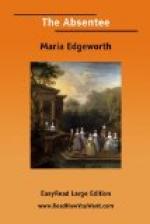‘I’m tired,’ said he, ’and have a right to be tired; for it’s no small walk I’ve taken for the good of this noble family this morning. And, Miss Nugent, before I say more, I’ll take a cup of Ta from you, if you please.’
Lady Clonbrony rose, with great stateliness, and walked to the farthest end of the room, where she established herself at her writing-table, and began to write notes.
Sir Terence wiped his forehead deliberately.
’Then I’ve had a fine run—Miss Nugent, I believe you never saw me run; but I can run, I promise you, when it’s to serve a friend. And, my lord (turning to Lord Clonbrony), what do you think I run for this morning—to buy a bargain—and of what!—a bargain of a bad debt—a debt of yours, which I bargained for, and up just in time—and Mordicai’s ready to hang himself this minute. For what do you think but that rascal was bringing upon you—but an execution?—he was.’
‘An execution!’ repeated everybody present, except Lord Colambre.
‘And how has this been prevented, sir?’ said Lord Colambre.
‘Oh! let me alone for that,’ said Sir Terence. ’I got a hint from my little friend, Paddy Brady, who would not be paid for it either, though he’s as poor as a rat. Well! as soon as I got the hint, I dropped the thing I had in my hand, which was the Dublin evening, and ran for the bare life—for there wasn’t a coach—in my slippers, as I was, to get into the prior creditor’s shoes, who is the little solicitor that lives in Crutched Friars, which Mordicai never dreamt of, luckily; so he was very genteel, though he was taken on a sudden, and from his breakfast, which an Englishman don’t like particularly—I popped him a douceur of a draught, at thirty-one days, on Garraghty, the agent; of which he must get notice; but I won’t descant on the law before the ladies—he handed me over his debt and execution, and he made me prior creditor in a trice. Then I took coach in state, the first I met, and away with me to Long Acre—saw Mordicai. “Sir,” says I, “I hear you’re meditating an execution on a friend of mine.” “Am I?” said the rascal; “who told you so?” “No matter,” said I; “but I just called in to let you know there’s no use in life of your execution; for there’s a prior creditor with his execution to be satisfied first.” So he made a great many black faces, and said a great deal, which I never listened to, but came off here clean to tell you all the story.’
‘Not one word of which do I understand,’ said Lady Clonbrony.
‘Then, my dear, you are very ungrateful,’ said Lord Clonbrony.
Lord Colambre said nothing, for he wished to learn more of Sir Terence O’Fay’s character, of the state of his father’s affairs, and of the family methods of proceeding in matters of business.
’Faith! Terry, I know I’m very thankful to you—but an execution’s an ugly thing—and I hope there’s no danger—’




